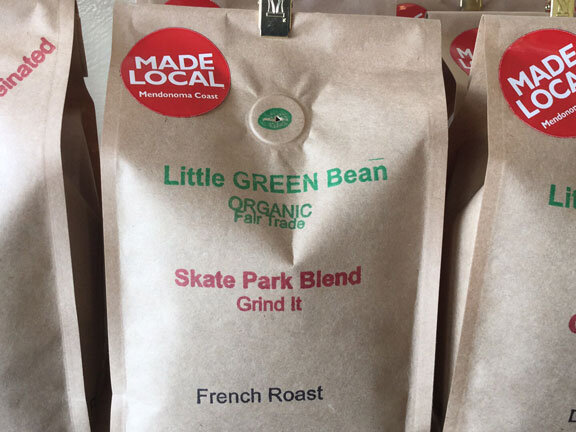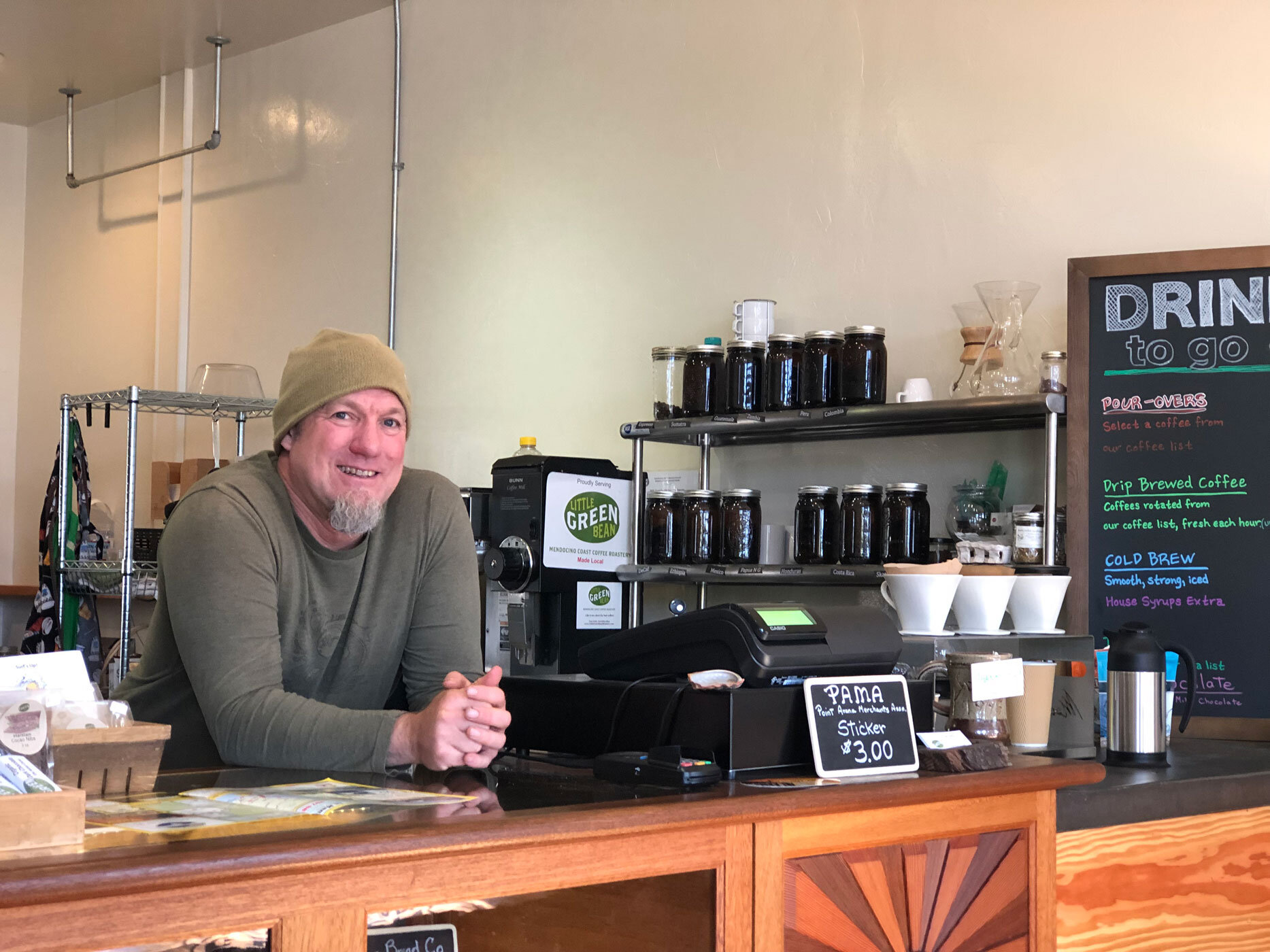Little Green Bean

by Dawn Emery Ballantine
Tom Neth’s biggest surprise on opening Little Green Bean, a Mendocino Coast Coffee Roastery located on Highway 1 in Point Arena, was “how welcoming the community was.” He realizes that his timing was perfect. The Shop Local movement was growing in popularity, and his venture, initially launched from his grandparents’ garage, fit beautifully. Still, Tom appreciates how the community has been “very positive and extremely supportive”—not surprising since the business contributes an essential element to Point Arena’s beauty and charm, and, for coffee lovers, roasts with taste unrivalled by competitors.
Though Tom grew up in LA, he visited his grandparents in Point Arena regularly and loved it so much that he moved up full time after he finished college. Initially, Tom worked in the Point Arena schools in the Home Study program and lifeguarded in San Diego during the summers. He then accepted a position as a lifeguard at Salt Point State Park, working nine months of the year for the next fifteen years, until an injury and the too-frequent casualties of the abalone season “took a toll” on him, and he left the park system.
Tom worked for friends for a while, moving between small jobs, until he decided to experiment with something he had always wanted to try—roasting coffee at home, just for fun. He started out with a Behmor 1600 roaster (similar to a toaster oven, says Tom), and he traded the results with neighbors for goat cheese and eggs. Tom recalls how his kids hated it when he was roasting coffee at home, as they often came home from school to hear the fire alarm blaring and the house smelling like smoke. This encouraged him to consider finding another location and take his hobby to the next level.
Tom’s wife, Rebecca, a teacher at Point Arena Elementary, had worked for Taylor Maid coffee, and it was she who suggested that Tom seriously consider roasting coffee as a business venture. She pointed him in the direction of the Diedrich Roasters (the gold standard of coffee roasting machines), and Tom took a 3-day class in Sand Point, Idaho, learning the basics of coffee roasting and making life-long connections with other neophyte roasters. They formed a collaborative and supportive Facebook group to share ideas and coffee notes, and the members started small businesses all over the country.
For the first year, the business was housed in his grandparents’ garage, and any money earned was poured right back into the operation. Tom decided to purchase specialty coffees (arabica beans are his preference) from all around the world, using a couple of different importers. All the coffee beans he sources are certified organic, fair trade, or Rain Forest Alliance, where the farmers are paid more and the focus is on sustainability of the forest, the farmers, and the the workers.
Tom had never run a business before, and he soon discovered what most small business owners know—“Money is just numbers moved back and forth . . . we don’t receive too much out of it.” The business was originally wholesale, with no public access, and Tom used that time to suss out the possibilities of growth and to see if he enjoyed all aspects of it enough to make it his daily work.
When Little Green Bean first expanded, they moved the operation into a space in the Outback Building across the street from their current location. Tom continued to refine his roasting techniques, preparing and tasting different coffees at various stages (called “cuppings,” somewhat like wine tasting) to discern the best flavor point for himself and for customers. He focused on growing his wholesale customer base, slowly beginning to add pour-over coffees so that they could sample his offerings.
In the meantime, Tom, also an avid chocolate fan, became curious about the process of roasting cacao beans and crafting chocolate. After visiting a cacao farm in Kauai, he began experimenting with roasting cacao beans, and decided to expand his business to include “bean to bar chocolate.” He initially roasted the cacao beans at home (sorry, kids!), working with information provided by the Chocolate Alchemy website and related YouTube videos. He quickly learned that “there are no shortcuts to making good chocolate . . . but I tried them all anyway.” (Seriously folks, there are no shortcuts.)
After experimenting with multiple bean varieties, Tom decided that Haitian chocolate was his favorite for it’s very fudgy flavor and feel. Little Green Bean partnered up with The Singing Rooster, a non-profit which sells Haitian cacao beans in a way that benefits both the farmer and the field worker. The beans might be more expensive, but as Tom says, “We use organic beans and want to support the small farms around the world . . . We are GREEN as our name suggests!”
Their Outback Building space was not set up for a retail business, so in order to create chocolate and expand their pour-over opportunities, they decided to grow again. The store-front next to Franny’s Cup and Saucer went on the market, and they purchased it in July of 2018, renovating the space and passing all the necessary building and health inspections to qualify them as a restaurant. They moved into the new space in February of 2019.
With the addition of the retail aspect, Little Green Bean has become a full-fledged family affair. Tom manages all aspects of the business himself. He spends 4 days a week in summer and 3 days in winter roasting coffee, and he handles all packaging, shipping, marketing, and deliveries. Tom’s wife works in the shop during summer break, and his sons help out regularly after school and on weekends. Tom’s mom designed the company website and works the shop whenever Tom is roasting, as well as on Sundays, coming in almost daily to help with operations. The addition of chocolate has only added to the schedule complexity.
The new location was a great success; Tom says that their business has increased by 50%. The challenge is to accommodate the increased foot traffic with a temperamental roasting schedule, which requires 30-second monitoring and recording. Even 15 seconds away from the roast-in-process at the wrong time can result in a burnt final product, so they will likely have to hire a second person to be in the shop so that Tom can dedicate himself to roasting both coffee and cacao beans to perfection.
The new shop boasts glass-fronted display cases, stainless steel counters, cork and vinyl flooring, Bunn coffee grinders, and drip coffee makers (for morning folks in a hurry). There are five pour-over stations for coffees and loose-leaf teas, and they also offer cold-brew coffee, where the grounds are soaked in cold water overnight, yielding a smoother, less acidic flavor. Little Green Bean merchandise is sold, including their own chocolates and bulk coffees, as well delicious treats from Franny’s Cup & Saucer on Mondays and Tuesdays when that bakery is closed.
Adjusting to a retail shop has been a process. Tom notes that he had no posted hours in the first five years of his business, so he had more freedom to come and go. When customers depend on your presence, it can feel a bit more “tied down.” An avid and excellent surfer—one community member states that “Tom is the best long-board surfer there is”—Tom’s least favorite part of the job is “having to work when the surf’s good.” The Point Arena cove is his favorite surf spot. One day this summer, the cove had the best swell in years. Tom closed the shop and went down to catch the waves, finding himself in good company with “the tile guy and a few local contractors.” Still, he opened the shop by noon—such is his dedication to his customers.
Point Arena is famed for its wild beauty and for its resilient and supportive community. Tom says he feels more at home in Point Arena than any other place he has lived. Little Green Bean filled a niche in the community, which has welcomed the venture with open arms. Local restaurants and cafes—Franny’s Cup & Saucer, Bird Café, Cove Coffee, White Cap, Gualala Hotel, and Headlands Inn—serve his coffee to customers, as do many AirBnBs and VRBOs in the area. Little Green Bean coffee can be purchased by the bag at Arena Market, S&B Market (Manchester), Surf Market (Gualala), Matson’s Mercantile (Elk), Harvest Market (Fort Bragg), and, soon coming to Boonville with the new pizza joint, Uneda Eats, which got its start in Point Arena.
Little Green Bean chocolates are only sold in their storefront in adorable, seascape-themed molds or by the bar. Also offered is various logo-themed merchandise featuring the rip-curl surf mashup of the Little Green Bean, created by a buddy of Tom’s, who “got it right on the first try.”
Tom says that roasting beans—coffee or cacao—has been a process of learning the craft, though he says, “I still don’t think I’m a master of it yet.” A modest man, indeed, as his coffee is pretty close to perfection.
Little Green Bean Roastery is open M-F 9am-4pm; Sat 10am-4pm; Sun 10am-2pm. 211 Main Street, Point Arena (on Hwy 1). Order online at LittleGreenBeanRoastery.com
Dawn Emery Ballantine lives in Anderson Valley, where she sells books in her boxcar bookshop, Hedgehog Books, edits this magazine and other wordy tomes, and fights a losing battle with her addiction to good coffee.


